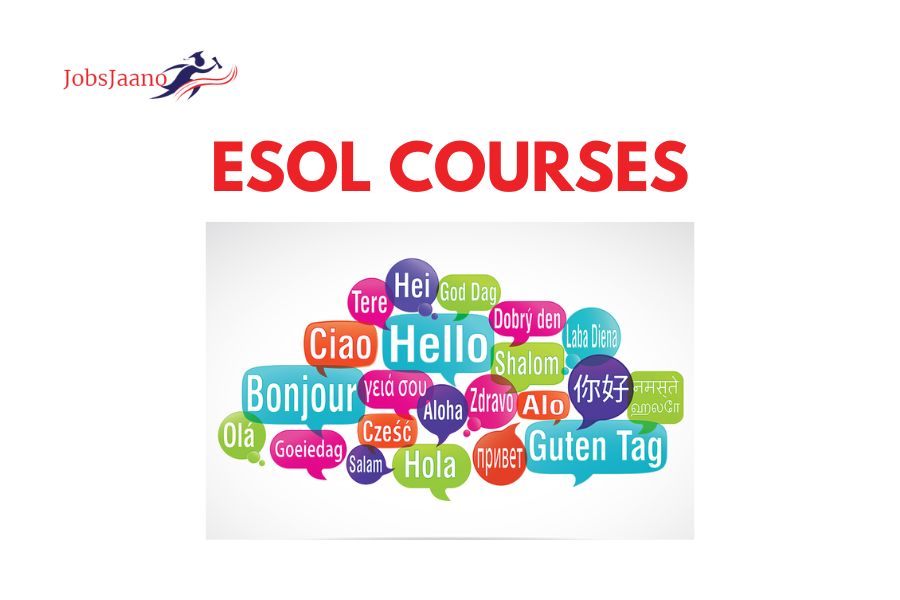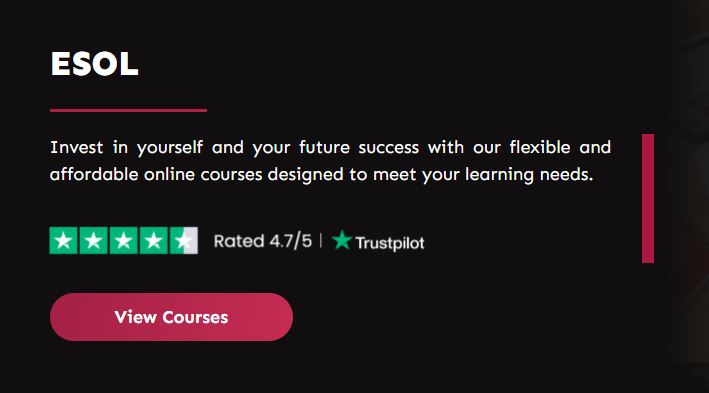ESOL Online [Courses], Classes, Certification: ESOL (English for Speakers of Other Languages) courses are designed to help non-native English speakers improve their English language skills. These courses are typically offered to individuals who want to enhance their English proficiency for various purposes, such as work, education, or daily life in an English-speaking country. Below take certification from leads academy (under Referral Program).
Use Coupon Code: JUNE 15
Get a 15% Discount on all courses


ESOL
Here is an explanation of ESOL courses:
- Target Audience: ESOL courses are primarily aimed at individuals who have a native language other than English and wish to develop their English language skills. This can include immigrants, international students, refugees, or individuals seeking to improve their language abilities.
- Language Proficiency Levels: ESOL courses usually cater to different proficiency levels, ranging from beginner to advanced. The courses are designed to help learners progress from basic communication skills to more advanced language competencies, including reading, writing, listening, and speaking.
- Curriculum and Content: ESOL courses focus on various aspects of the English language, including grammar, vocabulary, pronunciation, and functional language skills. The curriculum may cover everyday communication, workplace language, academic English, and specific language skills for different fields or industries.
- Cultural Awareness: ESOL courses often incorporate elements of cultural awareness and understanding. This can involve learning about cultural practices, customs, and social norms in English-speaking countries, as well as developing intercultural communication skills.
- Classroom Instruction: ESOL courses typically involve classroom-based instruction led by qualified English language teachers. Teachers use a variety of instructional methods, including lectures, group activities, pair work, discussions, and multimedia resources to facilitate language learning and practice.
- Assessment and Certification: ESOL courses may include regular assessments to gauge students’ progress and proficiency levels. These assessments can take the form of written exams, speaking assessments, listening comprehension tests, and written assignments. Some courses may also offer recognized certification upon successful completion, such as the Cambridge English exams or IELTS (International English Language Testing System).
- Flexible Course Formats: ESOL courses can be offered in various formats to accommodate different learners’ needs and schedules. They may be available as part-time or full-time courses, evening classes, online courses, or intensive language programs, allowing learners to choose a format that fits their lifestyle and commitments.
- Skills Development: ESOL courses aim to develop all four language skills: reading, writing, listening, and speaking. Students learn to read and comprehend written texts, write coherent and grammatically correct sentences and paragraphs, improve their listening comprehension, and develop their speaking abilities through conversation and discussions.
- Additional Support: ESOL courses often provide additional support services to assist learners in their language acquisition journey. This can include access to language laboratories, learning resources, language exchanges, tutoring, or language support centers where students can seek guidance and practice their language skills.
- Integration and Life Skills: ESOL courses may also include elements of integration and life skills training. This can involve learning about local community services, navigating public transportation, understanding legal and employment systems, and developing skills for daily life in an English-speaking environment.
- English Language Proficiency Assessments: ESOL courses often begin with an initial assessment of students’ English language proficiency to determine their starting level and identify areas for improvement. This assessment helps tailor the course content and instruction to meet individual learners’ needs.
- Language Support for Academic Purposes: ESOL courses may offer language support specifically tailored to students who are pursuing academic studies in an English-speaking institution. This can include academic writing skills, research techniques, presentation skills, and academic vocabulary development.
- Exam Preparation: Many ESOL courses offer preparation for English language proficiency exams such as IELTS, TOEFL, or Cambridge English exams. These courses focus on familiarizing students with the exam format, practicing exam-specific skills, and building confidence to achieve desired scores.
- Pronunciation and Accent Training: ESOL courses often address pronunciation and accent reduction to help learners improve their clarity of speech and communication. Students learn the correct pronunciation of English sounds, stress patterns, intonation, and other aspects to enhance their spoken English skills.
- Language and Cultural Immersion: Some ESOL courses provide opportunities for language and cultural immersion through activities such as field trips, cultural events, language exchanges, or interactions with native English speakers. These experiences help students practice their English in real-life contexts and gain insights into the local culture.
- Workplace English Skills: ESOL courses may focus on developing English language skills specific to the workplace. This includes business communication, professional vocabulary, writing emails and reports, conducting meetings, and enhancing job interview skills.
- Distance Learning and Online ESOL Courses: In addition to traditional classroom-based instruction, ESOL courses are increasingly offered online, allowing students to study at their own pace and from any location. Online courses provide flexibility and accessibility, making language learning more convenient for learners with different schedules and circumstances.
- Integration Support: ESOL courses often provide support for learners to integrate into the local community. This can include guidance on finding accommodation, accessing healthcare services, understanding local customs and traditions, and navigating daily life in an English-speaking environment.
- Individualized Learning Plans: ESOL courses may offer personalized learning plans based on the specific needs and goals of individual students. This allows learners to focus on areas of improvement that are most relevant to their personal, academic, or professional objectives.
- Continuing Education Pathways: ESOL courses can serve as a pathway to further education. After completing an ESOL course, students may choose to pursue higher-level English language qualifications, vocational courses, university degrees, or professional development programs.
- Conversation and Communication Skills: ESOL courses place a strong emphasis on developing conversational and communication skills. Students engage in various activities and discussions to practice expressing themselves fluently, understanding others, and building confidence in real-life communication situations.
- Cultural Competence and Intercultural Communication: ESOL courses often foster cultural competence and intercultural communication skills. Students learn to navigate cultural differences, understand cultural nuances in communication, and develop respect and empathy for diverse perspectives and backgrounds.
- Vocabulary Expansion: ESOL courses focus on expanding students’ vocabulary in both general and specialized areas. This includes learning common idioms, collocations, phrasal verbs, and academic or professional terminology, enabling learners to express themselves more precisely and effectively.
- Reading and Comprehension Skills: ESOL courses help students improve their reading and comprehension abilities. Students practice reading a variety of texts, such as articles, short stories, and academic passages, and develop strategies for understanding main ideas, details, and inferential meanings.
- Writing Skills Development: ESOL courses aim to enhance students’ writing skills in English. Students learn how to structure paragraphs and essays, express their ideas coherently, use appropriate grammar and vocabulary, and develop effective writing techniques for different purposes and genres.
- Supportive Learning Environment: ESOL courses strive to provide a supportive and inclusive learning environment for students. Teachers create an atmosphere that encourages participation, collaboration, and mutual support among learners, fostering a positive and motivating language learning experience.
- Technology Integration: Many ESOL courses incorporate technology into the learning process. Students may use computer-based programs, language learning apps, online resources, or multimedia materials to enhance their language skills, practice pronunciation, and engage in interactive exercises.
- Progress Monitoring and Feedback: ESOL courses regularly assess students’ progress and provide feedback on their language development. This helps students track their improvement, identify areas for further focus, and receive guidance from teachers to overcome challenges.
- Cross-Cultural Awareness: ESOL courses promote cross-cultural awareness and sensitivity by exploring cultural norms, values, and customs. Students gain a better understanding of cultural perspectives, learn to adapt their communication style, and develop the skills needed to interact effectively in multicultural environments.
- Lifelong Learning Skills: ESOL courses not only focus on English language skills but also cultivate broader lifelong learning skills. These include critical thinking, problem-solving, independent learning, and self-reflection, enabling students to continue developing their language proficiency beyond the course.
ESOL courses cater to the unique needs of non-native English speakers and provide them with the necessary tools to navigate English-speaking environments with confidence. The specific features and components of ESOL courses may vary depending on the institution, program, or specific goals of the learners. It’s advisable to research and consult with reputable language training providers or educational institutions to obtain detailed information about the ESOL courses available to you.
FAQs on ESOL Classes
-
Who can enroll in an ESOL course?
ESOL courses are open to individuals who have a native language other than English and want to improve their English language skills. This can include immigrants, international students, refugees, or anyone seeking to enhance their English proficiency.
-
What are the benefits of taking an ESOL course?
ESOL courses provide numerous benefits, such as improved communication skills, increased job prospects, better educational opportunities, enhanced cultural integration, and increased confidence in English-speaking environments.
-
How long does it take to complete an ESOL course?
The duration of an ESOL course can vary depending on the program and the learner’s starting level and desired outcomes. Courses can range from a few weeks to several months or even years, depending on the intensity and depth of study
-
Do I need any prior English language knowledge to enroll in an ESOL course?
No, ESOL courses are designed for learners at various language proficiency levels, including beginners with little to no prior English knowledge. Courses are typically tailored to meet the needs of learners at different stages of language acquisition.
-
Can I study an ESOL course online?
Yes, many ESOL courses are available online, providing flexibility for learners to study at their own pace and convenience. Online ESOL courses often include interactive lessons, multimedia resources, and opportunities for virtual communication and practice.
-
Will I receive a certificate upon completion of an ESOL course?
It depends on the program or institution. Some ESOL courses offer certificates of completion, while others may provide recognized qualifications, such as Cambridge English certificates or other internationally recognized language proficiency certifications.
-
Will an ESOL course guarantee fluency in English?
Fluency in English is a gradual process that depends on various factors, including individual effort, practice, and exposure to the language. ESOL courses provide a structured learning environment and guidance to help learners improve their language skills, but individual commitment and ongoing practice are essential for achieving fluency.
-
Can I join an ESOL course if I already have some English language skills?
Yes, ESOL courses are often designed to accommodate learners at different proficiency levels. If you already have some English language skills, the course can help you further enhance and refine your abilities.
-
Will an ESOL course help me with academic or professional goals?
Yes, ESOL courses often include components that specifically support academic or professional language skills. They can provide you with the necessary language proficiency and communication skills to excel in academic settings, job interviews, or workplace communication.
-
How can I find an accredited ESOL course?
To find an accredited ESOL course, you can research reputable language training institutions, universities, or community colleges that offer ESOL programs. Look for institutions that have a good reputation, experienced instructors, and accreditation from recognized educational bodies.
Related Queries:


